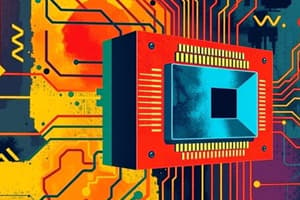Podcast
Questions and Answers
What is the von Neumann machine?
What is the von Neumann machine?
A computing architecture that describes a design where the data and program are stored in the same memory.
Which unit is responsible for arithmetic and logic operations?
Which unit is responsible for arithmetic and logic operations?
- Control Unit
- Input Unit
- Arithmetic and Logic Unit (correct)
- Output Unit
What does the Control Unit do?
What does the Control Unit do?
- Stores data permanently
- Fetches instructions from memory (correct)
- Executes arithmetic operations
- Processes input data
What is the role of the Main Memory?
What is the role of the Main Memory?
The Output Unit is responsible for:
The Output Unit is responsible for:
The von Neumann architecture has separate storage for data and programs.
The von Neumann architecture has separate storage for data and programs.
Which of the following components is not part of the von Neumann architecture?
Which of the following components is not part of the von Neumann architecture?
Study Notes
Introduction to Computer Systems
- The von Neumann machine: An early computer architecture presented by John von Neumann in 1946.
- ENIAC: One of the first electronic general-purpose computers, it was completed in 1945.
- Main Memory: Refers to the short-term storage in a computer; it primarily holds the data and programs currently in use.
Key Components of the von Neumann Architecture
- Arithmetic and Logic Unit (ALU): Performs all arithmetic and logical operations.
- Control Unit (CU): Directs the operation of the processor and coordinates the activities of all other components.
- Input Unit: Interfaces between the computer and the outside world, receiving data.
- Output Unit: Sends data out from the computer to the external environment.
Structure of the von Neumann Machine
- Memory Types: Main memory stores data and instructions, while additional storage may include disks and tapes.
- Common System Bus: A communication system that transfers data between components within the computer.
- Central Processing Unit (CPU): Immediately retrieves and processes instructions from memory.
Functions of a Computer
- Instructions Fetching: The process starts with fetching instructions from memory where they are stored.
- Processing: The CPU works on the fetched data, performing computations as needed.
- Storage: The results are stored back in memory, ready for access.
Data Handling
- Registers: Small, fast storage locations in the CPU used to hold temporary data for processing tasks.
- Program Counter (PC): Keeps track of the next instruction to be executed.
- Memory Address Register (MAR): Holds the address of the cell being accessed in memory.
- Instruction Register (IR): Contains the current instruction being executed.
- Data Transfer: Involves moving data and instructions between memory, registers, and external devices.
Technological Aspects
- Bit Processing: The architecture processes 16 bits of data simultaneously to enhance computing efficiency.
- Memory Capacity: A modern computer system typically manages capacities measured in gigabytes (GB) or more.
- I/O Operations: Involves both input and output processes, critical for computer interactions with users and other systems.
Summary of von Neumann Principles
- Sequential Processing: Instructions are executed in a linear sequence unless altered by control instructions.
- Stored Program Concept: Programs reside in memory, allowing the CPU to access and execute them as needed.
- Interdependencies: The interconnected components of the von Neumann architecture work together seamlessly to facilitate computing tasks.
Studying That Suits You
Use AI to generate personalized quizzes and flashcards to suit your learning preferences.
Related Documents
Description
This quiz introduces key concepts of computer science, focusing on the Von Neumann architecture and the ENIAC machine. Students will explore historical developments and fundamental principles related to computer systems. Test your understanding of these critical topics in computing.




